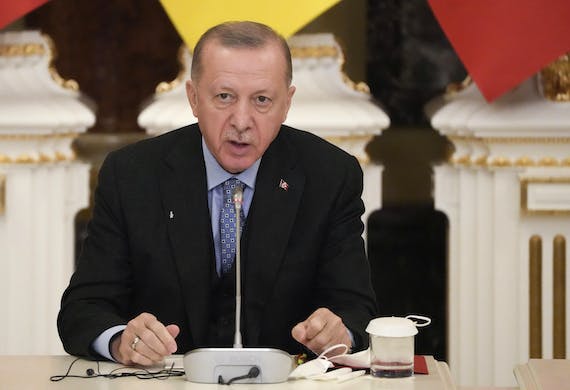From Istanbul, Mixed Messages on Civil Liberties
One Turkish court sentenced a civil rights activist and philanthropist to life in prison while another acquitted two reporters for Bloomberg.

In a move likely to bolster the impression left by the classic film “Midnight Express” that justice in Turkey is meted out sparingly if at all, a Turkish court this week sentenced a civil rights activist and philanthropist, Osman Kavala, to life in prison without parole, finding him guilty of attempting to overthrow the government with mass protests in 2013.
The Istanbul court handed down the sentence on Monday and also sentenced seven other defendants, including a 71-year-old architect, Mucella Yapici, to 18 years in prison for “aiding” the attempt. It ordered that the activists, who were not in custody, be immediately arrested.
The harsh sentence drew swift condemnation from diverse quarters including Amnesty International, whose Europe director, Nils Muižnieks, said, “We have witnessed a travesty of justice of spectacular proportions. This verdict deals a devastating blow not only to Osman Kavala, his co-defendants and their families, but to everyone who believes in justice and human rights activism in Turkey and beyond.”
Of the prosecuting authorities, Mr. Muižnieks said they had “repeatedly failed to provide any evidence that substantiates the baseless charges of attempting to overthrow the government,” adding: “This unjust verdict shows that the Gezi trial was only an attempt to silence independent voices.”
Gezi is a reference to the Gezi Park protests of 2013, which the Turkish authorities construed as an attempted coup. Separately, an actual coup d’état was attempted in July 2016.
The court’s decision, which is seen as final though it can be appealed, was assailed by many in the West as evidence of Turkey’s downward slide to autocracy. Mr. Kavala had already been languishing in prison prior to his conviction and as the Financial Times reported, the European Court of Human Rights had ordered his release in 2019.
Last year diplomats from 10 Western countries were nearly expelled from Turkey because they criticized Mr. Kavala’s rough treatment. The Financial Times bemoaned the Turkish president’s “march towards a 21st century sultanate.”
For his part, President Erdoğan, who also chairs Turkey’s ruling Justice and Development Party, seemed happy with the verdict, calling Mr. Kavala the “George Soros of Turkey.”
Meanwhile on Friday, a Turkish court acquitted two reporters for the U.S.-based Bloomberg news agency who were accused of trying to undermine Turkey’s economic stability with an article on Turkey’s currency crisis in 2018.
Istanbul-based reporters Kerim Karakaya and Fercan Yalinkilic had faced up to five years in prison over the article they wrote in August 2018. Some 30 other defendants who were on trial over their social media comments regarding Turkey’s economy and banks were also acquitted.
All defendants, who were charged following a complaint by Turkey’s banking watchdog, had denied the accusations.
Their case was seen as being part of a government crackdown on journalists and media outlets critical of the government. As many as 26 journalists and other media employees are currently in jail, according to Turkey’s Journalists’ Union.
Turkey’s currency hit record lows in the summer of 2018, amid worsening relations with the United States following the arrest of an American pastor. Turkey’s economy is currently in the throes of another crisis, with inflation sitting at 61 percent and the lira falling 44 percent in value against the dollar in 2021.
Since Russia’s invasion of Ukraine in February, NATO-member Turkey has intermittently taken on the role of an intermediary between Moscow and Kyiv, but so far to mixed results.
With Associated Press

